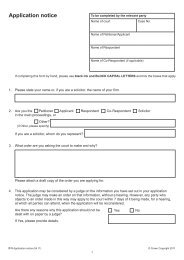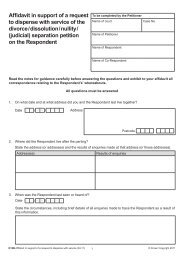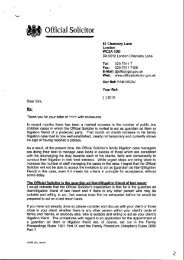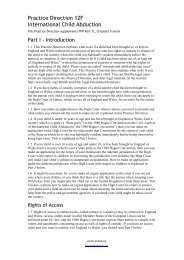D186 - The respondent has replied to my petition ... - Family Law
D186 - The respondent has replied to my petition ... - Family Law
D186 - The respondent has replied to my petition ... - Family Law
You also want an ePaper? Increase the reach of your titles
YUMPU automatically turns print PDFs into web optimized ePapers that Google loves.
<strong>The</strong> court may be able <strong>to</strong> help you calculate the first date on which you may apply for<br />
your decree nisi/conditional order.<br />
How do I apply for a decree nisi/conditional order?<br />
You will need copies of form D84 (application for a decree nisi/conditional order or (judicial)<br />
separation decree/order) and form D80 (affidavit in support) from the court office. <strong>The</strong>y are<br />
free.<br />
When you ask for form D80, make sure you tell the court the grounds for your divorce/<br />
dissolution. <strong>The</strong>re is a different version of form D80 for each of the grounds.<br />
Fill in form D84 and form D80, and send or take them <strong>to</strong> the court office. This is called<br />
‘entering your case in the undefended list’.<br />
You must not return these forms <strong>to</strong> the court until 9 days have passed since the<br />
<strong>respondent</strong> (and any co-<strong>respondent</strong>) say they received your <strong>petition</strong>.<br />
You must answer all the questions on form D80.<br />
What documents will I need <strong>to</strong> exhibit <strong>to</strong> the affidavit?<br />
You must provide documents which show:<br />
• that the <strong>respondent</strong> (and any co-<strong>respondent</strong>) have received the application<br />
• that the <strong>respondent</strong> (and any named co-<strong>respondent</strong>) admit <strong>to</strong> having committed<br />
adultery if this was a ground<br />
• that the <strong>respondent</strong> consents <strong>to</strong> a divorce where the grounds are that you have lived<br />
apart for two years, and<br />
• that the <strong>respondent</strong> agrees with the arrangements proposed for the children.<br />
In almost all cases a copy of the form D10/D510 (acknowledgement of service) filled in<br />
and signed by the <strong>respondent</strong> will show all of these things. <strong>The</strong> form D10/D510 should be<br />
exhibited <strong>to</strong> the affidavit.<br />
What will the court do with the forms D84 and D80?<br />
Court staff will place the papers with your case file and pass it <strong>to</strong> the Judge.<br />
<strong>The</strong> Judge will look at your <strong>petition</strong> and affidavit in support and decide if you can have a<br />
divorce/dissolution. You will not have <strong>to</strong> come <strong>to</strong> court when this is done.<br />
<strong>The</strong> Judge will also consider the arrangements for the children by looking at your form<br />
D8A (statement of arrangements for the children) and the <strong>respondent</strong>’s form D10/D510<br />
(acknowledgement of service).<br />
What will happen if the Judge says I can have a divorce/<br />
dissolution?<br />
<strong>The</strong> court will send you and the <strong>respondent</strong> (and any co-<strong>respondent</strong>) a form D84A<br />
(certificate of entitlement <strong>to</strong> a decree) or D584A (certificate of entitlement <strong>to</strong> an order).<br />
Page 2






